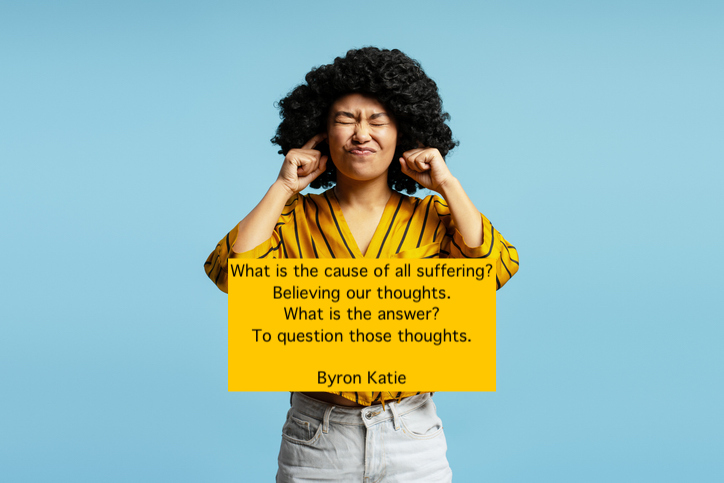Have you ever caught yourself spiralling into stress over a single thought? Maybe it’s “I’m not good enough,” or “They don’t respect me.” That one belief, left unchecked, can shape your emotions, your reactions, your body and even your relationships.
A single unchecked thought can hijack your entire nervous system! One moment, you’re fine, and the next, you’re spiralling—heart pounding, stomach in knots, mind racing through every worst-case scenario like it’s training for the apocalypse.
But what if questioning your thoughts could actually change your brain?
This is where The Work of Byron Katie comes in—a deceptively simple practice that has profound effects on how we think, feel, and respond to life. And science backs it up. From neuroplasticity to emotional regulation, The Work of Byron Katie provides a profound mechanism that can reshape the brain.
How Stressful Thoughts Get Stuck in the Brain
Think of your brain like a well-worn hiking trail. Every time you believe a stressful thought, your brain strengthens that pathway and it gets more entrenched. It works like this:
Negative Thought:“They don’t respect me.”
Emotional Reaction: Anger, sadness, or withdrawal.
Brain’s Response: The amygdala (your brain’s threat detector) lights up, reinforcing the belief.
Cycle Continues: Over time, this thought becomes transparent and automatic.
Your brain is designed to be efficient—it wants to protect you, so it strengthens beliefs that seem to “keep you safe.” The problem? Many of these thoughts aren’t true. They’re just interpretations of a reality.
The Work as a Brain-Rewiring Tool
Byron Katie’s four questionsand turnarounds might seem too simple to be life-changing, but let’s look at what they actually do to your brain:
1️. Is it true? Interrupts automatic thinking. Forces your prefrontal cortex (the logical part of your brain) to pause instead of reacting.
2️. Can you absolutely know that it’s true? Creates cognitive flexibility. The brain starts loosening its grip on rigid beliefs, making space for alternative perspectives.
The first two questions force your prefrontal cortex (the rational part of the brain) to slow down and reconsider automatic assumptions. Our executive functioning, those ambassadors come back online.
3️. How do you react when you believe that thought? Activates self-awareness. Your body’s stress response becomes visible—this is where real change begins. The third question builds metacognition, making you more aware of how your thoughts shape your emotional state.
4️. Who would you be without that thought? Stimulates neuroplasticity. Your brain starts rewiring new pathways, shifting toward calm, clarity, and curiosity.
And then comes the turnarounds—a plot twist for your mind. Instead of clinging to one rigid perspective, or that well worn hiking trail, you flip it:
“They don’t respect me” → “I don’t respect them” → “I don’t respect myself.”
Wait, what? Now, instead of being trapped in blame, you have an opening. A chance to see the situation differently, to experience it differently in the body, have choices again as you begin to find where that is true in your life.
Over time, practising The Work weakens old, stress-inducing feedback loops and strengthens new ones based on curiosity, openness, and clarity.
Meet Sarah: The Thought That Changed Everything
Imagine Sarah, a university student caught in a relentless loop of self-doubt. Every time she sits down to study, a familiar thought creeps in: “I’ll never be successful.” The more she believes it, the heavier it feels—anxiety sets in, motivation fades, and the cycle tightens its grip.
One day, she comes across The Work of Byron Katie and, almost sceptically, asks herself the first question: “Is it true?” For the first time, she pauses. Can she absolutely know that it’s true? The certainty begins to crack. As she moves through the four questions, something shifts. The thought that once felt like an absolute truth now feels… optional.
Her turnaround? “I am successful.” (In truth, there are already ways in which Sarah is successful and is a success and her brain starts to spark (those synapses start rewiring) as she remembers many. Success is not a fixed outcome but an ongoing process).
OR
“ I am a success”. (In truth, success isn’t only measured by external achievements. Sarah has grown, learned, and accomplished things in many ways that matter).
This is not a forced affirmation, but a quiet recognition of truth and endless possibilities.
Weeks pass, and Sarah notices something strange. The old thought still visits, but it no longer controls her. Anxiety loosens its grip. Motivation returns. Her brain—once locked in self-criticism—is learning a new way forward, not through blind positivity, but through the simple act of questioning the stressful thoughts to see if they are valid or true or not!
The Science of Inner Freedom
The beauty of The Work of Byron Katie isn’t just in the relief it brings—it’s in how it rewires the brain for lasting change.
Reduces emotional reactivity: By calming the amygdala.
Strengthens cognitive flexibility: By activating the prefrontal cortex and executive functioning.
Promotes resilience: By fostering new, empowering thought patterns.
As we dive into the neuroscience of The Work, one fundamental truth emerges: thoughts, in themselves, are neutral. It’s our unquestioned belief in them that causes suffering. When we believe a stressful thought, our brain reacts as if it’s reality—triggering the amygdala, fuelling stress hormones, and reinforcing well-worn neural pathways.
But as Byron Katie reminds us:
“A thought is just a thought. It’s not personal until you believe it.”
This is where The Work becomes so powerful. By questioning our thoughts, we loosen their grip, interrupt the brain’s automatic stress responses, and create space for clarity. Instead of being held hostage by our thinking, we step into the role of observer—curious, open, and free.
The next time a thought tightens its grip, turn toward it with curiosity. Let these four questions be lanterns in the fog, unravelling the illusions that bind you, rewiring your mind, and leading you back to the freedom that was always yours.
~ Written by Ami Besson (Integrative Therapist at The Awakening Group)



